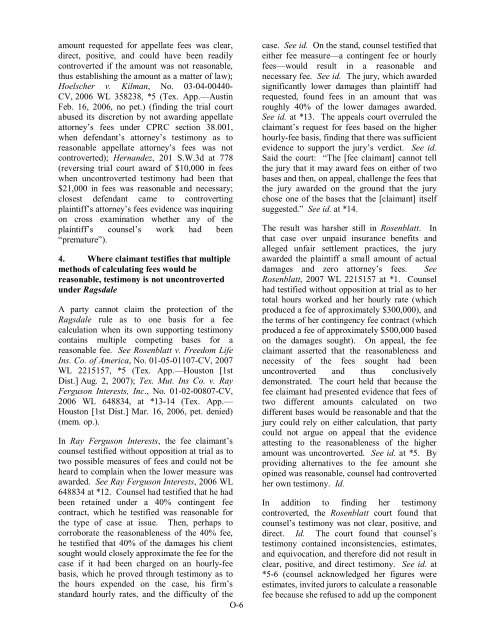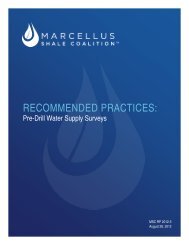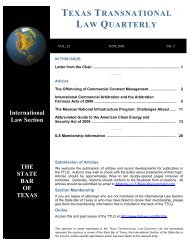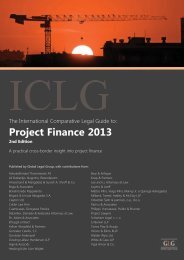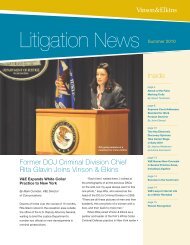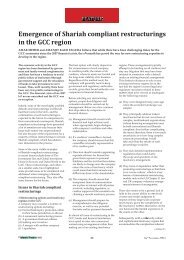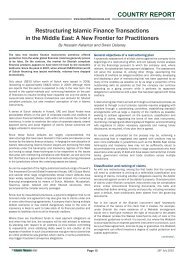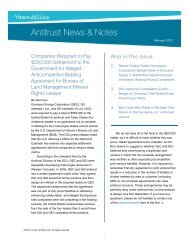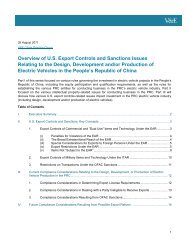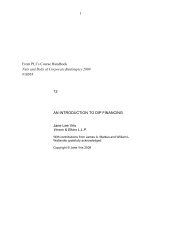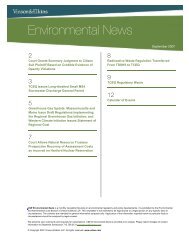Attorney's Fees Update - Vinson & Elkins LLP
Attorney's Fees Update - Vinson & Elkins LLP
Attorney's Fees Update - Vinson & Elkins LLP
You also want an ePaper? Increase the reach of your titles
YUMPU automatically turns print PDFs into web optimized ePapers that Google loves.
amount requested for appellate fees was clear,<br />
direct, positive, and could have been readily<br />
controverted if the amount was not reasonable,<br />
thus establishing the amount as a matter of law);<br />
Hoelscher v. Kilman, No. 03-04-00440-<br />
CV, 2006 WL 358238, *5 (Tex. App.—Austin<br />
Feb. 16, 2006, no pet.) (finding the trial court<br />
abused its discretion by not awarding appellate<br />
attorney’s fees under CPRC section 38.001,<br />
when defendant’s attorney’s testimony as to<br />
reasonable appellate attorney’s fees was not<br />
controverted); Hernandez, 201 S.W.3d at 778<br />
(reversing trial court award of $10,000 in fees<br />
when uncontroverted testimony had been that<br />
$21,000 in fees was reasonable and necessary;<br />
closest defendant came to controverting<br />
plaintiff’s attorney’s fees evidence was inquiring<br />
on cross examination whether any of the<br />
plaintiff’s counsel’s work had been<br />
“premature”).<br />
4. Where claimant testifies that multiple<br />
methods of calculating fees would be<br />
reasonable, testimony is not uncontroverted<br />
under Ragsdale<br />
A party cannot claim the protection of the<br />
Ragsdale rule as to one basis for a fee<br />
calculation when its own supporting testimony<br />
contains multiple competing bases for a<br />
reasonable fee. See Rosenblatt v. Freedom Life<br />
Ins. Co. of America, No. 01-05-01107-CV, 2007<br />
WL 2215157, *5 (Tex. App.—Houston [1st<br />
Dist.] Aug. 2, 2007); Tex. Mut. Ins Co. v. Ray<br />
Ferguson Interests, Inc., No. 01-02-00807-CV,<br />
2006 WL 648834, at *13-14 (Tex. App.—<br />
Houston [1st Dist.] Mar. 16, 2006, pet. denied)<br />
(mem. op.).<br />
In Ray Ferguson Interests, the fee claimant’s<br />
counsel testified without opposition at trial as to<br />
two possible measures of fees and could not be<br />
heard to complain when the lower measure was<br />
awarded. See Ray Ferguson Interests, 2006 WL<br />
648834 at *12. Counsel had testified that he had<br />
been retained under a 40% contingent fee<br />
contract, which he testified was reasonable for<br />
the type of case at issue. Then, perhaps to<br />
corroborate the reasonableness of the 40% fee,<br />
he testified that 40% of the damages his client<br />
sought would closely approximate the fee for the<br />
case if it had been charged on an hourly-fee<br />
basis, which he proved through testimony as to<br />
the hours expended on the case, his firm’s<br />
standard hourly rates, and the difficulty of the<br />
O-6<br />
case. See id. On the stand, counsel testified that<br />
either fee measure—a contingent fee or hourly<br />
fees—would result in a reasonable and<br />
necessary fee. See id. The jury, which awarded<br />
significantly lower damages than plaintiff had<br />
requested, found fees in an amount that was<br />
roughly 40% of the lower damages awarded.<br />
See id. at *13. The appeals court overruled the<br />
claimant’s request for fees based on the higher<br />
hourly-fee basis, finding that there was sufficient<br />
evidence to support the jury’s verdict. See id.<br />
Said the court: “The [fee claimant] cannot tell<br />
the jury that it may award fees on either of two<br />
bases and then, on appeal, challenge the fees that<br />
the jury awarded on the ground that the jury<br />
chose one of the bases that the [claimant] itself<br />
suggested.” See id. at *14.<br />
The result was harsher still in Rosenblatt. In<br />
that case over unpaid insurance benefits and<br />
alleged unfair settlement practices, the jury<br />
awarded the plaintiff a small amount of actual<br />
damages and zero attorney’s fees. See<br />
Rosenblatt, 2007 WL 2215157 at *1. Counsel<br />
had testified without opposition at trial as to her<br />
total hours worked and her hourly rate (which<br />
produced a fee of approximately $300,000), and<br />
the terms of her contingency fee contract (which<br />
produced a fee of approximately $500,000 based<br />
on the damages sought). On appeal, the fee<br />
claimant asserted that the reasonableness and<br />
necessity of the fees sought had been<br />
uncontroverted and thus conclusively<br />
demonstrated. The court held that because the<br />
fee claimant had presented evidence that fees of<br />
two different amounts calculated on two<br />
different bases would be reasonable and that the<br />
jury could rely on either calculation, that party<br />
could not argue on appeal that the evidence<br />
attesting to the reasonableness of the higher<br />
amount was uncontroverted. See id. at *5. By<br />
providing alternatives to the fee amount she<br />
opined was reasonable, counsel had controverted<br />
her own testimony. Id.<br />
In addition to finding her testimony<br />
controverted, the Rosenblatt court found that<br />
counsel’s testimony was not clear, positive, and<br />
direct. Id. The court found that counsel’s<br />
testimony contained inconsistencies, estimates,<br />
and equivocation, and therefore did not result in<br />
clear, positive, and direct testimony. See id. at<br />
*5-6 (counsel acknowledged her figures were<br />
estimates, invited jurors to calculate a reasonable<br />
fee because she refused to add up the component


